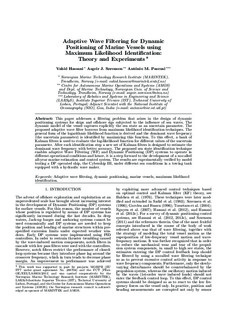Adaptive Wave Filtering for Dynamic Positioning of Marine Vessels Using Maximum Likelihood Identification: Theory and Experiments
Chapter
Accepted version
Permanent lenke
http://hdl.handle.net/11250/2490262Utgivelsesdato
2016Metadata
Vis full innførselSamlinger
- Institutt for marin teknikk [3431]
- Publikasjoner fra CRIStin - NTNU [38070]
Originalversjon
10.3182/20130918-4-JP-3022.00041Sammendrag
This paper addresses a filtering problem that arises in the design of dynamic positioning systems for ships and offshore rigs subjected to the influence of sea waves. The dynamic model of the vessel captures explicitly the sea state as an uncertain parameter. The proposed adaptive wave filter borrows from maximum likelihood identification techniques. The general form of the logarithmic likelihood function is derived and the dominant wave frequency (the uncertain parameter) is identified by maximizing this function. To this effect, a bank of Kalman filters is used to evaluate the log-likelihood function for different values of the uncertain parameter. After each identification step a new set of Kalman filters is designed to estimate the dominant wave frequency with better accuracy. The proposed sea state identification technique enables adaptive Wave Filtering (WF) and Dynamic Positioning (DP) systems to operate in different operational conditions and hence, it is a step forward to the development of a so-called all-year marine estimation and control system. The results are experimentally verified by model testing a DP operated ship, the Cybership III, under different sea conditions in a towing tank equipped with a hydraulic wave maker.

